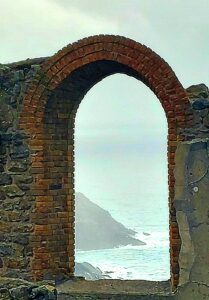The Maker The Charles Causley Literary Blog
March Musings by Sue Wallace-Shaddad
In my Musings last month I talked about attending the Charles Causley Trust’s Winter Warmer Poetry Retreat. The Trust plans many other events over the next few months including their annual festival, so do check out news items on the website. I have just started reading Patrick Gale’s novel, Mother’s Boy, which was published in 2022 and is based on Charles Causley’s boyhood and youth, available from Patrick’s website (Patrick is a Patron of the Trust). Dempsey and Windle have featured Charles Causley in their 190th newsletter . It is well worth signing up to this newsletter as it is very informative and also gives opportunities for reading at their regular open mic and having a poem published in the newsletter.
After the retreat I continued to the North Cornwall coast to stay with family for a few days. My daughter has been battling with understanding the lay of the land (literally), trying to get to the bottom of what exists by way of mining reports for where she lives. It reminded me that last year I reviewed Morag Smith’s pamphlet ‘Spoil’ (Broken Sleep Books) for The Alchemy Spoon Issue 7. You can read the online issue here and enjoy some excerpts from the poems. They cover tin mining in Cornwall and the tough lives of workers, particularly young women, the bal maidens. In the review I describe Morag’s poems as ‘grounded in the ancient physicality of the landscape.’
Mary J Oliver, writer and artist, recently shared a wonderful photograph on Facebook which she has kindly agreed I can share (below). She commented online: ‘I find it so hard to take a photo of a Cornish tin mine that isn’t naff’. The photo really brings home the closeness of many mines to the sea. I find I notice them much more in winter when there are no leaves on the trees. There were some 2000 tin mines in Cornwall in the 19th century and now, of course, there is a new interest in lithium mining.

I have just discovered the website which records the life and poetry of Cornish miner and poet John Harris, 1820 – 1824. There are some hugely evocative poems to be read there. You can also read a poignant poem by Wilfred Owen written in response to a coal mining disaster in Staffordshire, ‘Miners’, which also brings in the First World War, on the PoetryArchive website. Here is an extract:
I saw white bones in the cinder-shard,
Bones without number.
For many hearts with coal are charred,
And few remember.
Mining seems to me to have several commonalities with poetry. We have to mine language for the most appropriate word and image. We mine memories and events we and others have experienced. This can read to great riches when we hit a seam we can follow. A poem may take us deeper into the landscape before us; unexpected emotions can come to the surface. What might be considered ‘dross’, e.g. unused drafting, can be revisited again and may feed into another poem.
Happy mining as you write!
If you would like to contact me to comment or follow up, please send me an email via the contact box on my website







